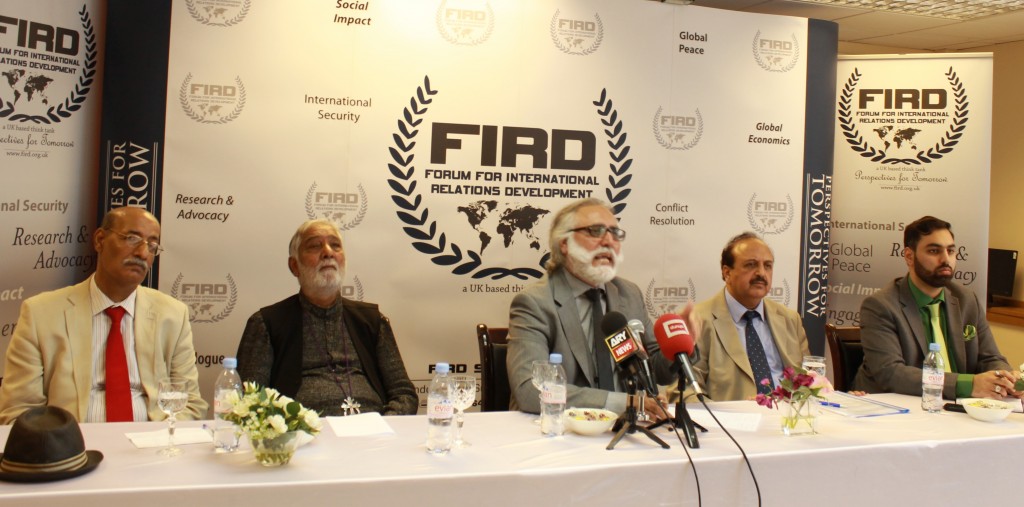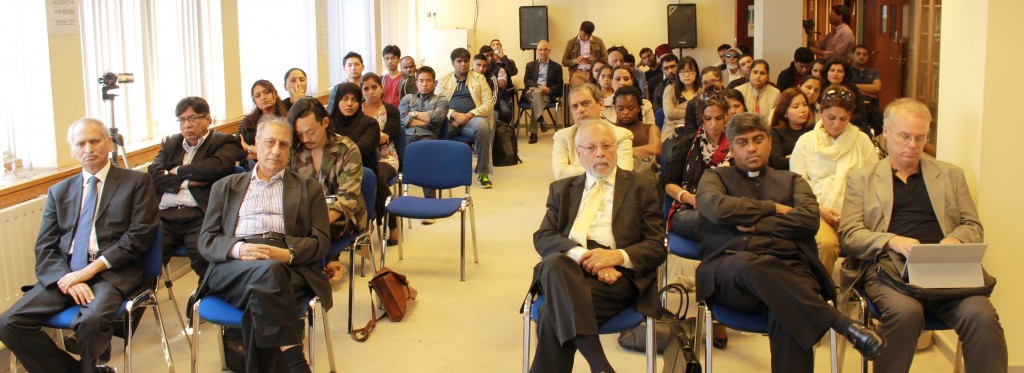“Rehabilitation Necessary for Briton Bound Terrorists” – Lord Hussain, Toaha Qureshi MBE, Bishop Rumal Shah by Umar Mahmood
“Rehabilitation necessary for Briton bound terrorists” is what the audience heard in a seminar titled “Perspectives: Countering Radicalisation in the Modern World” hosted by Forum for International Relations Development (FIRD) on Thursday 18 September 2014.

The seminar was hosted by Umar Mahmood, Fellow FIRD, and considered the current situation Britain faces with the rise of extremism and radicalisation that is affecting society. Speakers consisted of FIRD Chairman Toaha Qureshi MBE, with the keynote address being delivered by Lord Qurban Hussain of Luton, special address by Rt Rev Rumal Shah Bishop Emeritus of Peshawar and remarks being provided Alderman Mushtaq Lasharie.
Toaha Qureshi MBE, Chairman FIRD, delved into the work being carried out by the community before the terrible incidents of September 11 which worked on bringing different communities together through education which took place at a local Islamic community centre. The community was well aware of radicals and had even alerted the authorities, although they did not take any action. Unfortunately, the inaction of the police had led to several of those radicals, previously named by the community to the police, being involved in the London July attacks. Whilst the authorities were asleep, the community was wide awake and tackling the issues. Mr Qureshi went on to discuss projects to tackle radicalisation and rehabilitate people who were disaffected and disenfranchised, including “those from particularly high risk groups with respect to educational attainment, employment opportunities and the holding of extremist views”. According to a 173 page evaluation report by Middlesex University on the programme SEED, the Office of the Deputy Prime Minister stated “each of these individuals has been kept engaged and away from crime and anti-social behaviour. (ODPM, 2005:135).”
In particular, preventative and diversionary programmes such as religious and social mentoring are given better understanding of religion; education provisions, sport and gym activities were given to members of the community so that they are equipped them with tools to become effective members of society as opposed to radicals. To stop people from joining terrorist groups, we must continue to execute proactive strategies rather than reactive strategies, as well as rehabilitate those that have been disillusioned by distorted claims of religion.
Mr Qureshi said extremism has begun to spread and when someone is ill, you must treat the root causes. He queried as to whether the current government has assessed the root causes and whether they have failed to adequately address them. Issues such as the ongoing plight of Kashmir and Palestine have added fuel to the fire of radicalisation. If things are to get better, relations need to be normalised and progress is imperative. He advised Britain, as a democratic and world leader, to make its positive contribution to ensure that justice is given and peace can prosper.
Speaking on Pakistan, Mr Qureshi asserted it was not religion that influenced state policy, rather it was international policy, led by the CIA, to make Pakistan a front line state to counter the threat of communism as well as to involve Islamic seminaries in this effort. Due to this, there is no one minority that is under attack, in fact, mosques, shrines, imam bargahs, churches, army barracks, fruit and vegetable markets etc. have all been under attack from terrorists. Pakistan had given sacrifice for decades and it was about time that we [the Western countries] provided a helping hand to Pakistan for it to develop into an economically and politically viable state otherwise, our future generations for decades would suffer. He termed it as a moral and political duty for the international community.. Moreover, the Kashmir has been left unresolved for the last 40 years and the hostility between India and Pakistan has been fuelling extremism, but if East Timor and Southern Sudan can be put on the map, it’s clear that all the international community need to show practically commitment and willingness to enter into dialogue and find a long-term solution. The policy that UK has adopted saying that India considers intervention to be interference should not deter us from tackling this problem head on, just as we have intervened in Iraq, Syria, Libya and Southern Sudan. There have been a number of resolutions passed and acted upon for other regions, therefore, Kashmir issue should follow in a parallel process.
Alderman Mushtaq Lasharie begun with a historical view from Pakistan, saying that extremism there had started in 1962 when the head of America’s Central Intelligence Agency (CIA) said that communism could not be won without bringing “jihad” into Pakistan due to its integral position geo-politically. However, he warned that there was another radicalisation element that was equally as important, stating that a counter extremist movement had also started for the far right. Quoting Sweden and the UK for far right political agendas, he said that they had now become a force to be reckoned with since they have started to win numerous seats.
Rt. Rev. Rumal Shah, Bishop Emeritus of Peshawar, spoke on radicalisation under the influence of religion and faith. He said that there was a serious demonization of Islam through media – the radicals do not serve religion and thus should not matter. People are polluting and distorting religions to further their own agendas. There were never attacks on religious places or religion itself before because there was respect given to religion. Speaking on the Denmark cartoon scandal, Bishop Shah said that he urged the Danish to respect religious space and not to draw religion into political or personal plans. Respect for humanity has diminished and we urgently need that to come back.
Lord Qurban Hussain of Luton began his keynote address by thanking FIRD and Chairman Toaha Qureshi MBE for arranging such a timely and necessary seminar. Since the recent revelation of many Britons travelling to Syria and other countries to participate in what is described as terrorist activity, the status of the country has moved up to “severe” – it is believed that up to 500 people from Britain have gone, although people have suggested that it could well be around 1000. The ISIS situation has been seen as a generational struggle, according to Lord Hussain. The stark difference can be seen as history shows that the relationship of the West with countries such as Palestine and Kashmir have never been good but the wave of people joining terrorist groups has come about recently.

Lord Hussain went on to say that radicalisation was imported from the West to a minority of people and is not part of Pakistan’s fabric; the ideology is not within the general public. The war in Iraq was the biggest blunder he said, attributing this fact to his resignation from the Labour party. Additional comments were made about the way the government has been using its foreign policy, which has been criticized by many over the years, saying that the recent wars in Libya, Iraq, Afghanistan and others have fuelled radicalisation and have made Britons a target.
Lord Hussain said that justice and human rights must be equal, saying that Britain should boycott Israeli goods and stop arming them with weaponry whilst condemning the acts of Hamas and no excuses should be made for violence. If Gaza and Kashmir were resolved, half of the issues would be resolved – the policies regarding this need to be rounded and cleared up. However, advising people, he said that not everything online and in the media should be trusted, qualified imams and scholars should be asked questions about religion. If Scotland can be given the right to vote for their freedom and self-determination, so too should Kashmir and similarly if the East Timor situation can be resolved, so too can the Palestine plight be ended, he said.
Responding to questions by the audience, the speakers proposed that the arresting of people or refusal of entry for those coming back from countries where they supported “terrorist” activities, was wrong and instead they should be given rehabilitation. This would give people a better chance in the future and be a better preventative measure for radicalisation.
The event was attended by researchers, community members, students and activists including Amjad Bajwa, Saad Mahmood, Habib Jan, Ayub Aulia, Rehman Sheikh, Akram Kaimkhani, Adrian Fricker and Rev Rana Khan who concluded the session with a vote of thanks to FIRD and the speaker’s
![[X] Close](http://www.fird.org.uk/wp-content/themes/fird/images/close.png)





